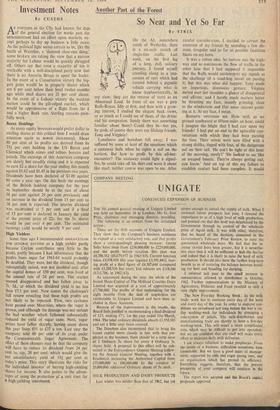A s everyone in the City had known the dale of the
general election for weeks past the announcement had no effect upon markets, ex- cept perhaps to dry up business a little more. As the political fight seems certain to be, like the battle of Waterloo, a 'damned close-run thing,' some brokers are taking the view that a narrow majority for Labour would be quickly shrugged off. Others say that even a majority of ten is workable with a well-disciplined party now that there is no Aneurin Bevan to upset the leader. In the event of a Conservative victory the big- gest gains would be in property shares which are 6 per cent below their level twelve months ago while steel shares are 21 per cent above. In the event of a Labour victory the weakest section could be the gilt-edged market, which would be apprehensive of a flight from the £ and a higher Bank rate. Sterling remains pain- fully weak.
Borax Holdings
As many equity investors would prefer dollar to sterling shares at this critical time I would draw attention again to BORAX (HOLDINGS). About 80 per cent of its profits arc derived from its 734 per cent holding in the US Borax and Chemical which mines and refines borates and potash. The earnings of this American company are slowly but steadily rising and it is expected to earn $2 a share for the year ending this month against $1.62 and $1.43 in the previous two years. Dividends have been declared of $1.00 against 80 cents a year ago. On this basis the earnings of the British holding company for the year to September should be at the rate of about 38 per cent against 29 per cent previously and an increase in the dividend from 15 per cent to 18 per cent is expected. The interim dividend was maintained at '5 per cent and if a final of 13 per cent is declared in January the yield at the present price of 22s. for the 5s. shares would be just over 4 per cent. The estimated earnings yield would be nearly 9 per cent.
High Yielders -
Some time ago I recommended ANGLO-CEYLON AND GENERAL ESTATES as a high yielder partly because Ceylon contributes very little to the profit, partly because I had information that the profits from sugar for 1963-64 would probably be doubled. They were, but the dividend, though substantially raised, was not doubled and, after the capital bonus of 150 per cent, was fixed at the annual rate of 24 per cent. The market seemed disappointed and has fallen away to 7s. 3d., at which the dividend yield is no less than 17.1 per cent. Now comes the chairman's full review revealing that these high profits are not likely to be repeated. First, two cyclones have passed over Mauritius, where the sugar is grown, and although the damage was not serious the bad weather which followed substantially reduced the yield of sugar cane. Next, sugar prices have fallen sharply, having come down this year from £91 to £37 a ton. Last year the company sold 60 per cent of its crop under the Commonwealth Sugar Agreement. The effect of these changes may be that the company Will have to reduce its dividend from 24 per cent to, say, 20 per cent, which would give the not unsatisfactory yield of 134 per cent at today's price. This story illustrates the risks for the individual investor of buying high-yielding shares for income. It also points to the advan- tages of using the protection of a unit trust for a high-yielding investment.


































 Previous page
Previous page